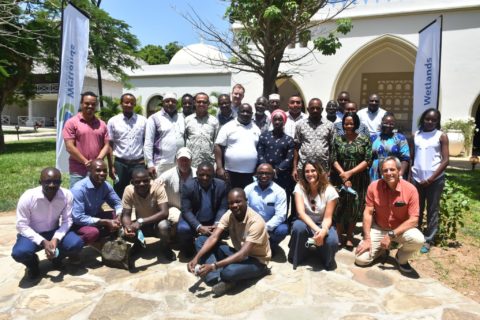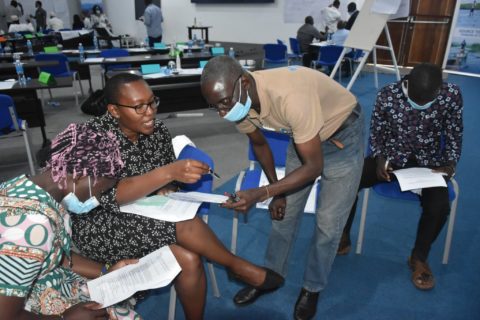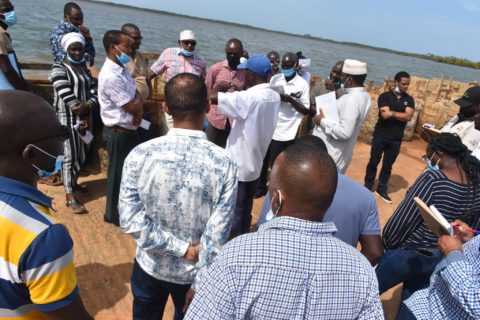Globally, wetlands are vital for human livelihoods and nature. These landscapes that provide critical ecosystem services – which far exceed terrestrial ones – lie at the heart of sustainable development. Yet policy and decision-makers at local, national, regional and international levels often underestimate the value of wetlands to nature and people.
Despite providing fundamental services, wetlands in Eastern Africa are under threat. They continue to be lost and degraded mainly due to intensive agriculture, wood harvesting and overgrazing. The main drivers of the pressure on these landscapes are rising population growth, high poverty levels, economic development, pollution, erosion and climate change.

Stakeholders from Kenya and Tanzania with faculty at the MGA training in Malindi
Due to this complexity, sustainable management of wetland landscapes in the region requires stakeholders from governments, local communities, civil society, private sector, research institutions amongst others to collaborate toward shared goals and objectives.
In reality, though, this is easier said than done as multiple stakeholders in one landscape can have common and differing interests, with the latter sometimes leading to intense conflict that may spill over local boundaries and national borders. In such contexts, one of the conventional ways to negotiations is the zero-sum approach where gains to one party are usually at a cost to another or others. This approach is more often than not skewed, with one party winning and another losing.
Conversely, the Mutual Gains Approach (MGA) in negotiation seeks joint solutions that benefit all parties, encourages cooperation and builds relationships. This is applicable even before differences between parties escalate to conflict. Through this approach, the stakeholders can also build consensus, trust and relationships that help to achieve more gains for all parties as opposed to one, help solve and long-term problems, and forge a shared landscape vision.
From the foregoing context, Wetlands International together with widely experienced faculty from Alcedo Consultancy facilitated training on MGA for multiple stakeholders who are key in the four landscapes under the Source to Sea initiative. The two cohorts of 47 trainees in total comprised Kenyan, Ethiopian and Tanzanian representatives from government agencies, community organisations, NGOs and staff from Wetlands International Eastern Africa. Each cohort underwent a week-long highly intensive training.

MGA training entails group exercises, simulations and clinics that help trainees grasp the concepts better
Several high-pressure simulations were used to practically learn the four steps of MGA: preparation, creating value, distributing value and following through. Careful preparation is the essential step in negotiations as it helps to focus on the objective, manage tempers and boost creativity. Further, understanding the difference between aspirations, positions, interests, bottom lines and issues as well as having a ‘Best Alternative to a Negotiated Agreement’ (BATNA) is vital. This helps in creating and distributing value for all parties. And as with other conventional negotiation approaches, the role of culture is also important in MGA.
Besides presentations, simulations and exercises, field excursions to a salt-producing company and a geothermal power plant were conducted to learn about the social, economic and environmental issues around the two landscapes (mangroves and freshwater wetlands) that pose a threat to management, the role of negotiation including MGA and the benefit of dialogue between stakeholders.

Stakeholders from Kenya and Tanzania during a field excursion at a salt-producing company in Malindi
But perhaps what surprised some, if not all the participants, was the realisation and deeper understanding that the interests shared have more in common than differences; that what they think are interests are usually positions; that interests change but positions don’t; and that by seeking to know and understand interests and options of all parties helps to find mutual solutions amicably. The practicality of the training also equips the stakeholders to utilise the MGA approach in their respective settings.
In most cases, the participants learn something new about themselves from the simulations and exercises such as discovering new skills which they can build on or areas that they may need to improve for professional and personal growth. And more than anything, there is also higher self-awareness which helps the individual integrate the learned MGA techniques into their everyday interactions at work or personal spaces.
Lead image by Michel Laplace-Toulouse: Dassanech community and their cattle at the delta of Omo River on border of Kenya and Ethiopia

